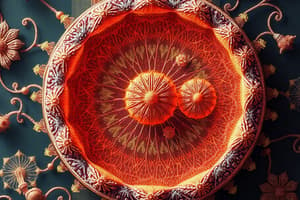Podcast
Questions and Answers
What is the main function of cell division?
What is the main function of cell division?
- To synthesize the constituents of the cell
- To increase the size of the cell
- To reduce the number of chromosomes in a cell
- To duplicate the genome and eventually divide into two daughter cells (correct)
What is the total number of chromosomes in haploid (n) human cells?
What is the total number of chromosomes in haploid (n) human cells?
- 92
- 46
- 23 (correct)
- 69
What are somatic cells and how are they produced?
What are somatic cells and how are they produced?
- They are nerve cells produced through mitosis
- They are cells involved in sexual reproduction, produced through meiosis
- They are body cells produced through mitosis and have 46 chromosomes (23 pairs) (correct)
- They are stem cells produced through binary fission
What is the structure that joins two identical sister chromatids?
What is the structure that joins two identical sister chromatids?
In which phase of the cell cycle does DNA replication occur?
In which phase of the cell cycle does DNA replication occur?
What is the purpose of the G1 phase in the cell cycle?
What is the purpose of the G1 phase in the cell cycle?
Which type of cell division involves a single cell dividing to produce 2 new identical daughter cells?
Which type of cell division involves a single cell dividing to produce 2 new identical daughter cells?
Which phase marks the period during which DNA synthesis or replication takes place?
Which phase marks the period during which DNA synthesis or replication takes place?
What is the significance of the M phase in the cell cycle?
What is the significance of the M phase in the cell cycle?
In a human cell, what is the duration of cell division proper compared to interphase?
In a human cell, what is the duration of cell division proper compared to interphase?
Flashcards are hidden until you start studying
Study Notes
Cell Division Overview
- Main function of cell division is to allow growth, tissue repair, and reproduction in organisms.
- Somatic cells are body cells that undergo mitosis to produce more identical cells for growth and tissue maintenance.
Chromosomal Information
- Haploid (n) human cells contain a total of 23 chromosomes, which is half the number of chromosomes found in diploid cells.
Cell Cycle and Phases
- The structure that joins two identical sister chromatids is called the centromere.
- DNA replication occurs during the S phase (Synthesis phase) of the cell cycle.
- G1 phase (Gap 1 phase) serves the purpose of cell growth, nutrient assessment, and preparation for DNA synthesis.
Types of Cell Division
- Mitosis is the type of cell division that involves a single cell dividing to produce two new identical daughter cells.
- The M phase (Mitotic phase) signifies the period of cell division—necessary for genetic consistency in daughter cells.
Duration of Cell Cycle Phases
- Cell division proper has a significantly shorter duration compared to interphase, which includes G1, S, and G2 phases, where the cell prepares for division.
Studying That Suits You
Use AI to generate personalized quizzes and flashcards to suit your learning preferences.




